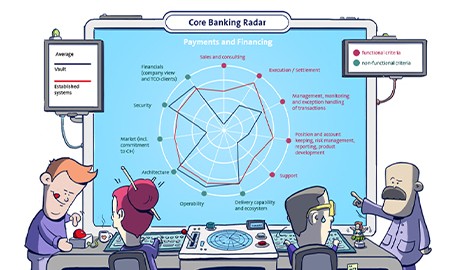Expert interview with Dario Tam, e.foresight
«The most successful private banks offer the optimum balance of personal and digital interaction»
In the interview, Dario Tam, private banking digitisation specialist at e.foresight, outlines the specific variations and requirements for digitising private banks.
Text: Matthias Niklowitz, Image: Swisscom, 25
What are the biggest differences between private banks and retail banks?
Private banks work exclusively with wealthy customers, and the specific needs of this very demanding client base are therefore at the forefront of their considerations. While retail banks achieve economies of scale with largely standardised products and services, private banks provide highly personalised solutions tailored to the individual circumstances of each customer. These go hand in hand with a portfolio of exclusive additional services that cannot be directly accessed by retail customers due to the high financial barriers to entry. Barriers of this nature are mandated by the regulatory authorities to ensure that the risks associated with private market assets and structured credit solutions, for example, are borne solely by wealthy individuals with broad-based portfolios. These customers are also offered other services, such as extensive asset and inheritance planning, as well as non-banking extras, such as the procurement of luxury goods, transport services and medical advice.
In the retail banking sector, digitisation is ubiquitous, and the buzzword is mobile banking. What are the most important issues for the private banking sector when it comes to digitisation?
At present, private banks are under particular pressure to digitise in the fields of customer interaction, investment consulting, product integration and operational transactions. While hybrid analogue and digital interaction models need to be optimised to meet the needs of individual customer types, data-driven approaches to investment consulting open up new opportunities to improve quality and returns. At the same time, investment managers can set themselves apart from competitors by seamlessly integrating different product types into their consulting and reporting processes.
What can private banks learn from the best in the industry?
The most successful private banks of the future will understand their customers’ needs and offer the optimum balance of personal and digital interaction. Advisers will establish customers’ issues and concerns during personal discussions with them. Services will then be flexibly tailored to customer needs and provided in a cost-effective manner by deploying digital tools. Strategic partnerships with selected investment partners and leading fintechs will ensure that new products and services are rapidly integrated and operational without the excessive use of banks’ own resources.
When it comes to digitisation, what can private banks learn from other sectors?
Notably in the case of hyper-personalisation and the development of new customer groups, private banks would do well to look at the example of the car industry’s luxury segment. A prime example is Tesla, which has demonstrated how to utilise technological progress and new customer requirements through an appropriate balance of industrialisation, innovation and individualisation. Tesla’s systematic strategy of pursuing innovation has resulted in profitability.

Dario Tam, private banking digitisation specialist at e.foresight
What will private banking look like in the future?
Digitisation and the changing needs of customers are forcing private banks to adapt their business model. Private banks will increasingly offer their services in an open digital ecosystem. By harnessing the latest technology and using open interfaces to connect systems both to each other and also across different companies, investment managers can select the most suitable products to offer to their customers. The customer adviser role is also changing considerably. Banking is becoming ever faster and more direct. Customer advisers increasingly need to manage a range of electronic channels. Due to the huge increase in electronic channels, wealthy customers are looking for greater personal interaction. In particular, customers seek personal interaction when discussing sensitive or emotional issues, meaning that customer advisers should receive appropriate additional training in this area.
What action should private banks take now to prepare for the future?
Private banks should take an open and structured approach to future changes at an early stage. At e.foresight, we support private banks in strategically managing innovation. We recommend that they regularly discuss the following five issues:
- What are the trends and potential scenarios for the banking sector in the near future and in 2025/30?
- As a bank council, which of the scenarios do we believe in and why (evaluation)?
- What will it mean for my bank if I do nothing (simulation)?
- How can we be successful in the new environment (vision)?
- And what are the steps required to achieve this (strategy)?

Newsletter
Would you like to regularly receive interesting articles and whitepapers on current ICT topics?
Andere Leser interessierte auch:





